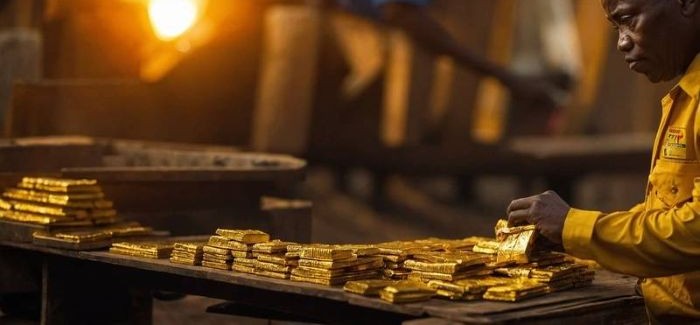(3 Minutes Read)
Ghana has broadened its gold purchase initiative by securing agreements with nine additional mining companies to supply 20% of their gold output, according to a statement released by GoldBod, the government agency managing the programme.
This expansion is part of a larger strategy to consolidate gold acquisitions, build up foreign currency reserves, and stabilise the cedi. The announcement, shared via a post on social media platform X and reported by Reuters, highlights Ghana’s ongoing commitment to leveraging its status as Africa’s leading gold producer.
Launched in 2022, the programme initially included major players such as Newmont, AngloGold Ashanti, Gold Fields, and Asanko Mining, all of whom agreed to sell one-fifth of their annual production directly to the Bank of Ghana in local currency.
The latest agreement brings nine more companies—Golden Team Mining, Akroma Gold, Adamus Resources, Cardinal Namdini Mining, Goldstone Akrokeri, Earl International Group (GH), Xtra Gold Mining, Prestea Sankofa Gold, and Gan He Mining Resource Development.
These firms are now required to deliver 20% of gold earmarked for export to GoldBod in doré bar form, a semi-pure gold-silver alloy. GoldBod hailed the deal as “a major step towards maximising national benefits from Ghana’s gold wealth.”
Since the programme’s inception, the Bank of Ghana’s gold holdings have jumped from 8.77 metric tons in 2022 to 30.8 tons by February 2025, contributing to a rise in gross reserves to USD 9.4 billion.
Together, the newly added firms are expected to contribute about 200 kilograms of gold monthly. Payments will be made in cedis, priced at a 1% discount to the LBMA spot rate.
Read Also;
The policy shift coincides with a 29% surge in global gold prices, driven by tariff hikes in the U.S. and ongoing geopolitical tensions. By converting part of its gold exports into domestic reserves, Ghana aims to reduce its dependence on foreign currency and limit illegal trade and market volatility.
GoldBod continues to advocate for stronger local participation in the sector and is working to formalise operations among small-scale miners to boost legitimate exports and earnings.





